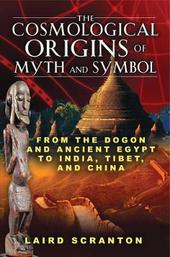
|
The Cosmological Origins of Myth and Symbol: From the Dogon and Ancient Egypt to India, Tibet, and China
Paperback / softback
Main Details
| Title |
The Cosmological Origins of Myth and Symbol: From the Dogon and Ancient Egypt to India, Tibet, and China
|
| Authors and Contributors |
By (author) Laird Scranton
|
| Physical Properties |
| Format:Paperback / softback | | Pages:208 | | Dimensions(mm): Height 229,Width 152 |
|
| Category/Genre | Ancient religions and mythologies |
|---|
| ISBN/Barcode |
9781594773761
|
| Classifications | Dewey:201.3 |
|---|
| Audience | |
|---|
| Illustrations |
29 b&w illustrations
|
|
Publishing Details |
| Publisher |
Inner Traditions Bear and Company
|
| Imprint |
Inner Traditions Bear and Company
|
| Publication Date |
24 September 2010 |
| Publication Country |
United States
|
Description
Reconstructs a theoretic parent cosmology that underlies ancient religion * Shows how this parent cosmology provided the conceptual origins of written language * Uses techniques of comparative cosmology to synchronize the creation traditions of the Dogon, ancient Egyptians, and ancient Buddhists * Applies the signature elements of this parent cosmology to explore and interpret the creation tradition of a present-day Tibetan/Chinese tribe called the Na-Khi--the keepers of the world's last surviving hieroglyphic language Great thinkers and researchers such as Carl Jung have acknowledged the many broad similarities that exist between the myths and symbols of ancient cultures. One largely unexplored explanation for these similarities lies in the possibility that these systems of myth all descended from one common cosmological plan. Outlining the most significant aspects of cosmology found among the Dogon, ancient Egyptians, and ancient Buddhists, including the striking physical and cosmological parallels between the Dogon granary and the Buddhist stupa, Laird Scranton identifies the signature attributes of a theoretic ancient parent cosmology--a planned instructional system that may well have spawned these great ancient creation traditions. Examining the esoteric nature of cosmology itself, Scranton shows how this parent cosmology encompassed both a plan for the civilized instruction of humanity as well as the conceptual origins of language. The recurring shapes in all ancient religions were key elements of this plan, designed to give physical manifestation to the sacred and provide the means to conceptualize and compare earthly dimensions with those of the heavens. As a practical application of the plan, Scranton explores the myths and language of an obscure Chinese priestly tribe known as the Na-Khi--the keepers of the world's last surviving hieroglyphic language. Suggesting that cosmology may have engendered civilization and not the other way around, Scranton reveals how this plan of cosmology provides the missing link between our macroscopic universe and the microscopic world of atoms.
Author Biography
Laird Scranton is an independent software designer who has studied ancient myth, language, and cosmology for nearly 10 years. An authority on Dogon mythology and symbolism, he has given lectures at Colgate University and is the author of The Science of the Dogon and Sacred Symbols of the Dogon. He lives in Albany, New York.
Reviews"Pursuing the powerful quest began in The Science of the Dogon, Laird Scranton provides . . . another compulsive read for those wishing to get to the heart of the ancient mysteries." * Andrew Collins, author of Beneath the Pyramids: Egypt's Greatest Secret Uncovered * "Laird Scranton's groundbreaking new research is a major piece of the puzzle that will forever change the way we view the knowledge of the ancients." * Edward G. Nightingale, author of The Giza Template * "Looking at many ancient cultures and looking for their influences, The Cosmological Origins of Myth and Symbol proposes many unique ideas and makes for a solidly recommended read." * The Midwest Book Review, December 2010 * "Following up and synthesizing his last two books, The Science of the Dogon, and Sacred Symbols of the Dogon, Laird Scranton's latest book makes a good case that what we call today the myths and symbols of ancient peoples have not only cosmology as their basis but they originated from one "parent" cosmology. . . most fascinating study. . . " * New Dawn Magazine, May 2011 * "An inspiring journey through cosmology." * Nexus Magazine, August 2011 *
|